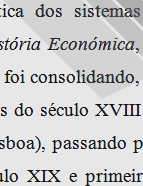

................................
She served as director of both the Centre for Historical Studies at the Faculty of Letters of the University of Lisbon (1958-1973), and of the latter institution itself (1964-1969). She was committed to studying previously unexplored themes in the field of economic history, and went on to publish: Subsídios para o estudo das feiras medievais portuguesas [Contributions to the Study of Portuguese Medieval Fairs] (1943, undergraduate dissertation, also covered in the Dicionário de História de Portugal [Dictionary of Portuguese History] published by Joel Serrão, vol. II, 1965, pp. 195-198); Sesmarias medievais portuguesas [Portuguese Medieval Uncultivated and Abandoned Land] (1946, doctoral thesis, a topic she synthesised in the same Dictionary, vol. IV, 1968, pp. 845-847); "The Dutch and the Export of Salt from Setúbal at the End of the 17th Century" (1949); A Casa dos Contos [The House of Stories] (1951). Her work demonstrates a solid documental foundation and a global perspective on history, incorporating various aspects of reality into the historical narrative (José Amado Mendes, "A renovação..." ["The Renewal..."], 1996, pp. 295-296; Paulo Morais Alexandre, "Rau, Virgínia Robertes...", 2000, pp. 219-210). Equally relevant to the development of economic history in the 1950s-1960s was Jorge Borges de Macedo (1921-1996). After completing his secondary education at Passos Manuel Secondary School in the capital, he enrolled at the Faculty of Letters of the University of Lisbon (1939), in the course of Historical-Philosophical Sciences, completing his bachelor's degree in 1944. He held teaching positions in technical education (at Machado de Castro and Fonseca Benevides Schools in Lisbon, and at Colégio Moderno, also in the capital). In 1957, he joined the aforementioned Faculty of Letters as an assistant, earning his doctorate in 1964. He underwent habilitation examinations in 1967 and a call for tender for full professorship in 1968. He taught several courses at the Faculty, also supervising seminars and doctoral theses. He held various cultural and scientific positions, including membership in the Cultural Commission of the XVII Exhibition of Science, Art, and Culture and, in 1993, coordinator of the nucleus of the National Museum of Ancient Art and, from 1990 to 1996, Director of the National Archives of Torre do Tombo. He was removed from teaching at the Faculty of Letters (1974-1980), to which he later returned. In the meantime, in 1977, he was invited by the Portuguese Catholic University to join the staff of Contemporary History and Diplomatic History (Jorge Pedreira, "Godinho, Vitorino Magalhães", 1999, pp. 405-406; José Amado Mendes, Op. Cit., 1996, pp. 296-299).
